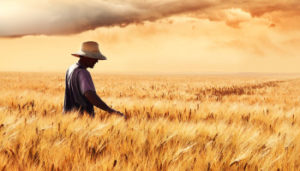The harvest is plentiful, but the workers are few
Mount Calvary Church
A Roman Catholic Parish
The Personal Ordinariate of the Chair of S. Peter
Eutaw St. and Madison Ave.
Baltimore, Maryland
Rev. Albert Scharbach, Pastor
Dr. Allen Buskirk, Choirmaster
Trinity III
July 7, 2019
Summer Schedule
One Mass at 9:00 A.M.
Breakfast following in the undercroft
____________________
Common
Merbecke
___________________
Anthems
George Fredrick Handel (1685-1759)
Haec est regina virginum que genuit regem veiut rosa decora. Virgo Dei genitrix per quam reperimus Deus et homine alma virgo intercede pro nobis.
Behold the queen of virgins who, like a beautiful rose, brought forth the King! Virgin mother of God, through whom we perceive God and man, Blessed Virgin, pray for us.
Here is Anne-Sofie von Otter.
_________
Hymns
Come, ye thankful people, come (WINDSOR), written by Henry Alford (1810—1871) echoes the gospel of today, with Christ’s call for workers for the harvest. The first stanza focuses directly on the physical harvest, an image used throughout scripture from in Genesis through Revelation. The second stanza begins Alford’s expansion of the parable. Alford applies it to how joy and sorrow grow together in life, and how God does not eliminate sorrow until after the final harvest when God “will wipe every tear from their eyes.” The third and fourth stanzas move directly to the apocalypse with “For the Lord our God shall come.”
WINDSOR, by George Job Elvey (1816—1893). is named after the chapel in Windsor, England, where Elvey was organist for forty-seven years. This serviceable Victorian tune is held together by the rhythmic motive of the opening phrase.
Father, we thank Thee (RENDEZ A DIEU) is a translation by the Rev. Francis Bland Tucker (1896—1984; UVA 1914) of a portion of the Didache (c. 110 AD) that describes the manner of celebrating the Eucharist: “concerning the broken bread. We thank thee, our Father, for the life and knowledge which thou hast made known unto us through Jesus thy Son; to thee be the glory forever. As this broken bread was once scattered on the mountains, and after it had been brought together became one, so may thy Church be gathered together from the ends of the earth unto thy kingdom.”
RENDEZ A DIEU is attributed to the Reformed composer, Loys Bourgeois (c 1510—1561). This beloved tune is one of the finest and most widely sung of the Genevan psalm tunes because of its clear melodic structure and vibrant rhythm.
All Creatures of our God and King (LASST UNS ERFREUEN) is based upon the Canticle of Brother Sun by St. Francis of Assisi (1182—1226). It was written in stages during the final year of his life, while he was nearly blind. Francis wrote: “For His praise, I wish to compose a new hymn about the Lord’s creatures, of which we make daily use, without which we cannot live.” We and all creation exist to honor and praise God. We praise God even for bodily death, because it is through the gates of death that we return home to Him and enter the New Creation. It was paraphrased by the Rev. William Henry Draper (1855—1933).
LASST UNS ERFREUEN is an arrangement by Ralph Vaughan Williams of a German tune from the Cologne Geistliche Kirchengesänge (Köln, 1623)
